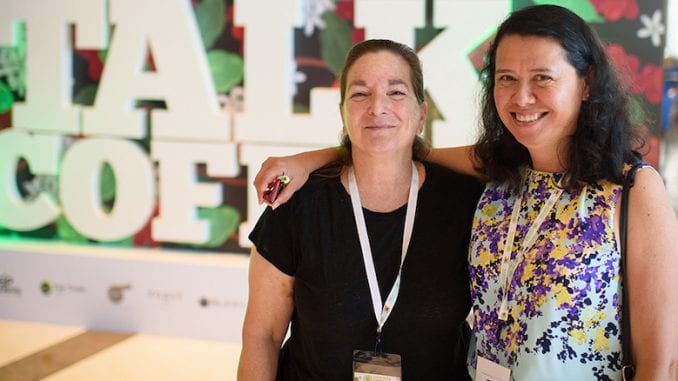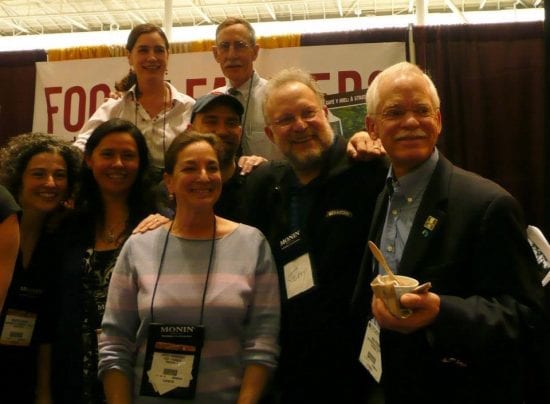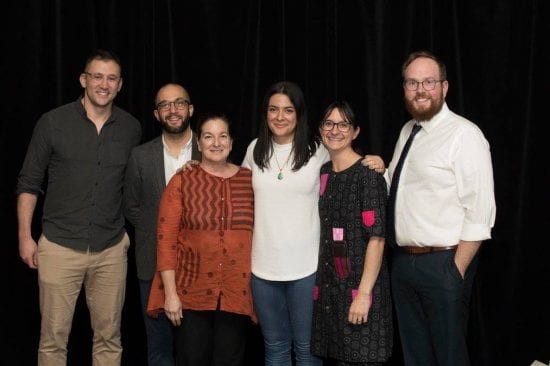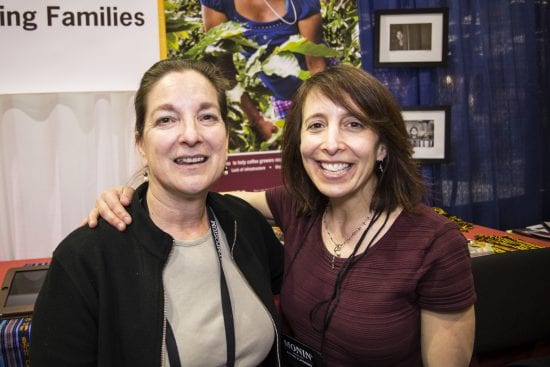
We get to know the co-director of Food 4 Farmers, a nonprofit organization fighting food insecurity in coffee communities.
BY CHRIS RYAN
BARISTA MAGAZINE ONLINE
Photos courtesy of Janice Nadworny
In the June + July 2020 issue of Barista Magazine, we interviewed Marcela Pino, who co-founded Food 4 Farmers nearly a decade ago with Rick Peyser and Janice Nadworny. The organization works in Mexico, Guatemala, Nicaragua, and Colombia, and aims to achieve sustainable, community-appropriate solutions to hunger. It helps farmers assess and implement solutions to food insecurity, including growing food and starting new businesses to supplement their income from coffee.
In addition to showcasing Marcela in the current issue, we wanted to shine a light on her Food 4 Farmers co-director, Janice Nadworny, who had an unlikely journey through the world of Wall Street before ending up in the coffee world. In the first section of this two-part interview, we learn about Janice’s upbringing, her time in the financial sector, and her journey to the coffee world.

Chris Ryan: First, can you tell us a bit about your childhood?
Janice Nadworny: I grew up in Vermont. My parents were from the Bronx, and when my dad got a job offer from the University of Vermont in 1952, he and my mom moved up, then had four kids. My dad loved it here, and we spent most of our time outside, all year long—and generally out and about in nature (because there wasn’t much else to do).
Music and art were essentials at my house. My mom had been an artist before she started teaching, and she played piano. We all played musical instruments. I was in the Vermont Youth Orchestra, spent my time making art and writing, and my room was full of pets. And we read everything—books, comics, whatever. They were our drugs. After all, we had two teachers for parents!
What was the coffee situation like in your household growing up?
My first coffee memory was walking into the local A&P and smelling that amazing coffee smell. There was a big grinder in the middle of a slanting wood floor, with chaff all over.
My parents drank coffee daily: Mom drank Sanka, Dad drank Maxim. They brought the percolator out for every party. I started drinking coffee in high school when I lived in France as part of an exchange program in Bergerac, near Bordeaux. My French mom made café crème with a croissant every day for breakfast, and I was hooked. Unfortunately, there was no such thing back home in Vermont at the time.
What did you study in school, and what did you originally think you might pursue professionally?
I’ve always loved the natural world, gardening, travel, learning languages, art, music, and writing. Because Vermont is so close to Montreal, I studied French, then Russian in college. (Both are useless for my work in Latin America.)
I wanted to be a wildlife biologist, but when I found out I’d have to take organic chemistry, that dream ended. I loved art, but my always-practical mom encouraged me to take my dad’s economics class. I was fascinated by the concepts of economic value, systems, and power, and their real-world consequences.

Can you describe the journey to you ending up on Wall Street, and a bit about your time there?
My dad had lots of former students who ended up on Wall Street. My boyfriend’s dad was working for Salomon Brothers, and he encouraged me to apply for a summer internship. So, I moved to New York in 1976, working in the back office of Salomon’s London branch. [There were] lots of luminaries, including Henry Kaufman, who did a regular weekly economic briefing for all interns. The guy that got me the job was on the international arbitrage desk. I’d visit him and see Billy Salomon holding court, smoking his giant cigar. I had no clue what I was doing. I ended up running the back office, and they offered me a full-time job. I turned it down to finish college, then went to work for the First National Bank of Chicago on the Institutional Money Desk, where I ended up as their top salesperson.
There were very few women on the trading floor at that time, and we all got the crap accounts. I was 21 years old, so I got the crappiest ones. I had nothing to lose, so I’d call prospects and tell them where they could find the best rates at other institutions. After a while, they began to appreciate my honesty and started investing with me. The rampant misogyny and sexual harassment were brutal—there wasn’t even a name for harassment, much less legal recourse. After three years, I moved to Boston, and closer to home where I managed the City of Boston’s $500 million retirement fund, then worked for Fidelity Investments and then Colonial Management, where I headed up Shareholder Communications. My challenge was to translate investment jargon into language someone like my grandmother could understand. By the early ’90s, the mutual fund managers could no longer explain how the securities in their portfolios worked, and I thought to myself, wow, they’re making it up! It turned out to be true, and I was done.

Can you describe why you ended up leaving Wall Street to return to Vermont? What did you do professionally back in Vermont, and how did that lead to you starting to work in the coffee realm?
My dad died in 1992, and I wanted to be closer to my mom, so I came home. It was time, anyway—working in the investment industry took a toll. I need to feel like I’m doing some good in the world and not just living for myself, and that business was completely incompatible with my personal value system. Initially, I was curious to see if financial markets could be reformed to allow for a bit more of wealth-sharing, I came to realize that this system would never reform itself—maybe around the edges, but not the shift that was necessary.
So, I emigrated to the nonprofit world. I took a job with the University of Vermont as director of the Annual Fund. My mom warned me about toxic university politics, but I thought, how could it be worse than Wall Street? Turned out, it was.
After several years at UVM, I started working as a nonprofit consultant, helping small NGOs, and did some financial writing for Fidelity and other firms, until the next meltdown in 2008. At that point, I was finally done with financial services, took a fundraising job at Grounds for Health, and discovered coffee.
Check back tomorrow for the remainder of this interview!

